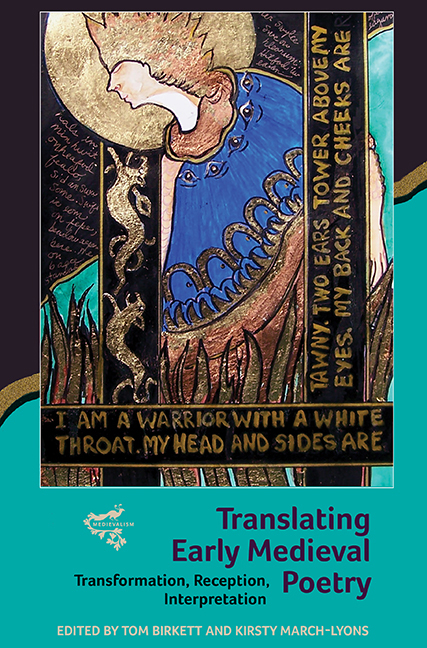Book contents
- Frontmatter
- Contents
- Acknowledgements
- Contributors
- Introduction: From Eald to New
- 1 From Eald Old to New Old: Translating Old English Poetry in(to) the Twenty-first Century
- 2 Edwin Morgan's Translations of Anglo-Saxon Poetry: Turning Eald into New in English and Scots
- 3 Gains and Losses in Translating Old English Poetry into Modern English and Russian
- 4 Borges, Old English Poetry and Translation Studies
- 5 ‘Let Beowulf now be a book from Ireland’: What Would Henryson or Tolkien Say?
- 6 The Forms and Functions of Medieval Irish Poetry and the Limitations of Modern Aesthetics
- 7 Aislinge Meic Conglinne: Challenges for Translator and Audience
- 8 Translating Find and the Phantoms into Modern Irish
- 9 Reawakening Angantýr: English Translations of an Old Norse Poem from the Eighteenth Century to the Twenty-first
- 10 Translating and Retranslating the Poetic Edda
- 11 From Heroic Lay to Victorian Novel: Old Norse Poetry about Brynhildr and Thomas Hardy's The Return of the Native
- 12 Michael Hirst's Vikings and Old Norse Poetry
- Afterword
- A Translation of Riddle 15 from the Exeter Book
- Bibliography
- Index
- Miscellaneous Endmatter
5 - ‘Let Beowulf now be a book from Ireland’: What Would Henryson or Tolkien Say?
Published online by Cambridge University Press: 01 September 2018
- Frontmatter
- Contents
- Acknowledgements
- Contributors
- Introduction: From Eald to New
- 1 From Eald Old to New Old: Translating Old English Poetry in(to) the Twenty-first Century
- 2 Edwin Morgan's Translations of Anglo-Saxon Poetry: Turning Eald into New in English and Scots
- 3 Gains and Losses in Translating Old English Poetry into Modern English and Russian
- 4 Borges, Old English Poetry and Translation Studies
- 5 ‘Let Beowulf now be a book from Ireland’: What Would Henryson or Tolkien Say?
- 6 The Forms and Functions of Medieval Irish Poetry and the Limitations of Modern Aesthetics
- 7 Aislinge Meic Conglinne: Challenges for Translator and Audience
- 8 Translating Find and the Phantoms into Modern Irish
- 9 Reawakening Angantýr: English Translations of an Old Norse Poem from the Eighteenth Century to the Twenty-first
- 10 Translating and Retranslating the Poetic Edda
- 11 From Heroic Lay to Victorian Novel: Old Norse Poetry about Brynhildr and Thomas Hardy's The Return of the Native
- 12 Michael Hirst's Vikings and Old Norse Poetry
- Afterword
- A Translation of Riddle 15 from the Exeter Book
- Bibliography
- Index
- Miscellaneous Endmatter
Summary
THE QUOTATION IN my title is taken from a lecture delivered by Seamus Heaney in Aberdeen in 2001 and published the following year. After making the claim for Beowulf that I quote, Heaney goes on to cite Bede's account of Ireland in the Preface to his Ecclesiastical History, as follows:
There are no reptiles, and no snake can exist there; for although often brought over from Britain, as soon as the ship nears land, they breathe the scent of its air, and die. In fact, almost everything in this isle confers immunity to poison, and I have seen that folk suffering from snake-bite have drunk water in which scrapings from the leaves of books from Ireland have been steeped, and that this remedy checked the spreading poison and reduced the swelling.
It is not entirely clear what Heaney means by this, but he seems to be suggesting that his translation has turned Beowulf into something distinctively Irish that will have, to judge from what he says elsewhere in his lecture, a healing, palliative effect, allowing Beowulf to be seen as part of a ‘Britannic’ body of literature which includes literature in the Celtic languages as well as English, and so contributing to increased understanding among the peoples of Ireland and its neighbouring islands. If this is indeed Heaney's claim, it is a large one, and I should like to question in this paper his competence to make it. I am not competent myself to discuss in detail the supposed ‘Irishness’ of Heaney's translation, though I would note that it has been pointed out, by one who is competent to do so, that ‘the use of Irish vocabulary’ in his translation is ‘actually quite limited’ (‘Irish vocabulary’ is meant here in the sense of words characteristic of Hiberno-English, some of them derived from the Irish language). What I shall do is concentrate on certain details of two of Heaney's translations with the following conviction in mind: that whatever innovations a translator intends to introduce into the work he is translating, he must approach the task of translation with a clear understanding of the syntactic and, where poetry is concerned, metrical workings of his original.
- Type
- Chapter
- Information
- Translating Early Medieval PoetryTransformation, Reception, Interpretation, pp. 75 - 91Publisher: Boydell & BrewerPrint publication year: 2017



